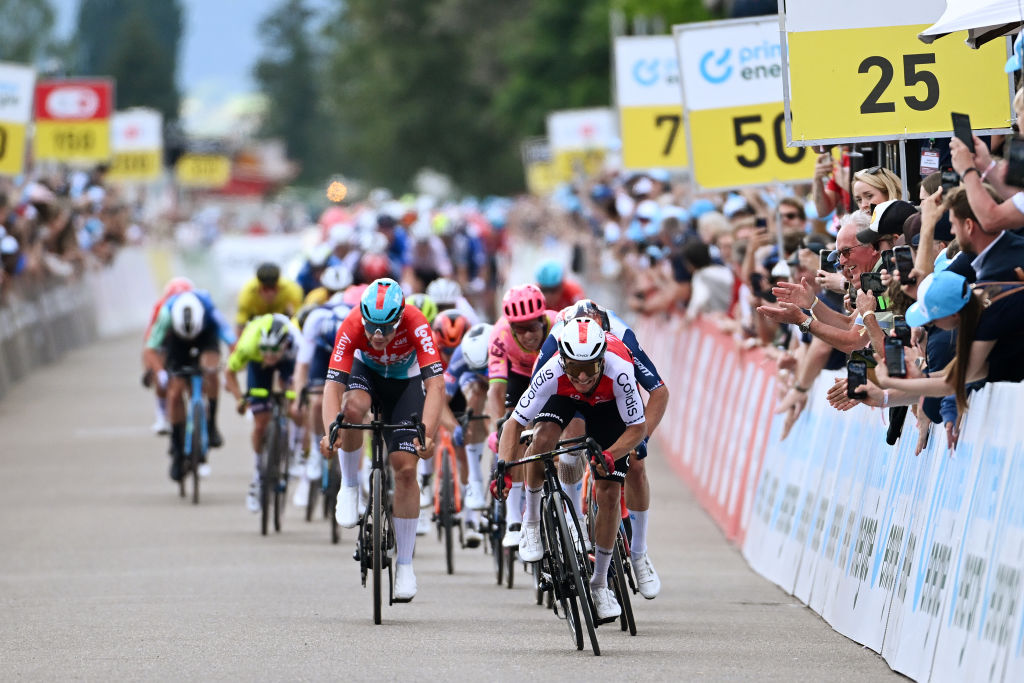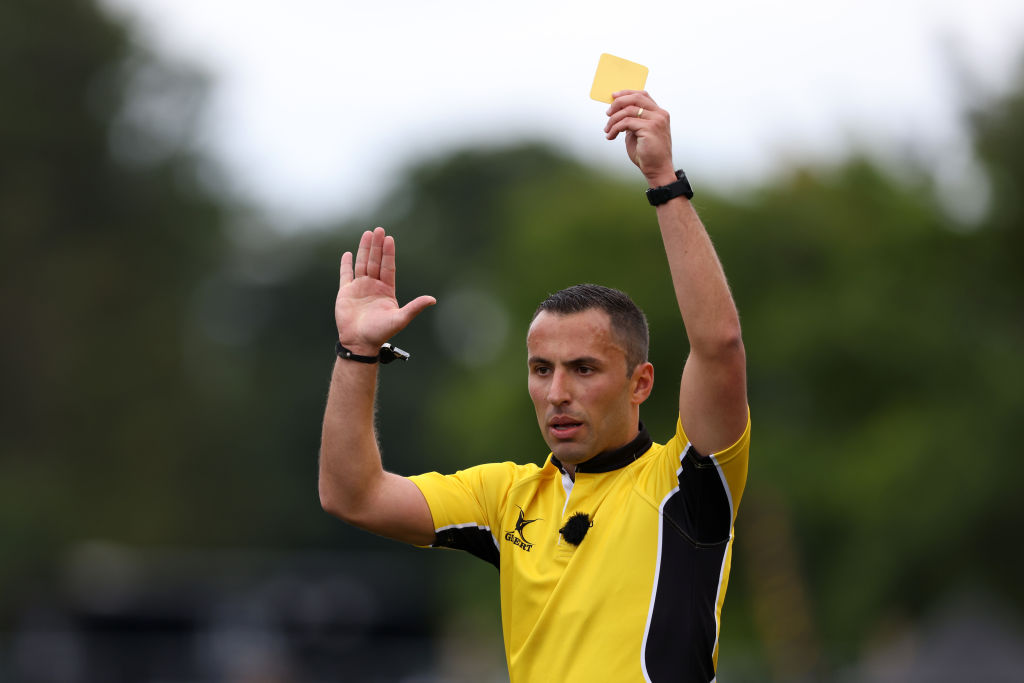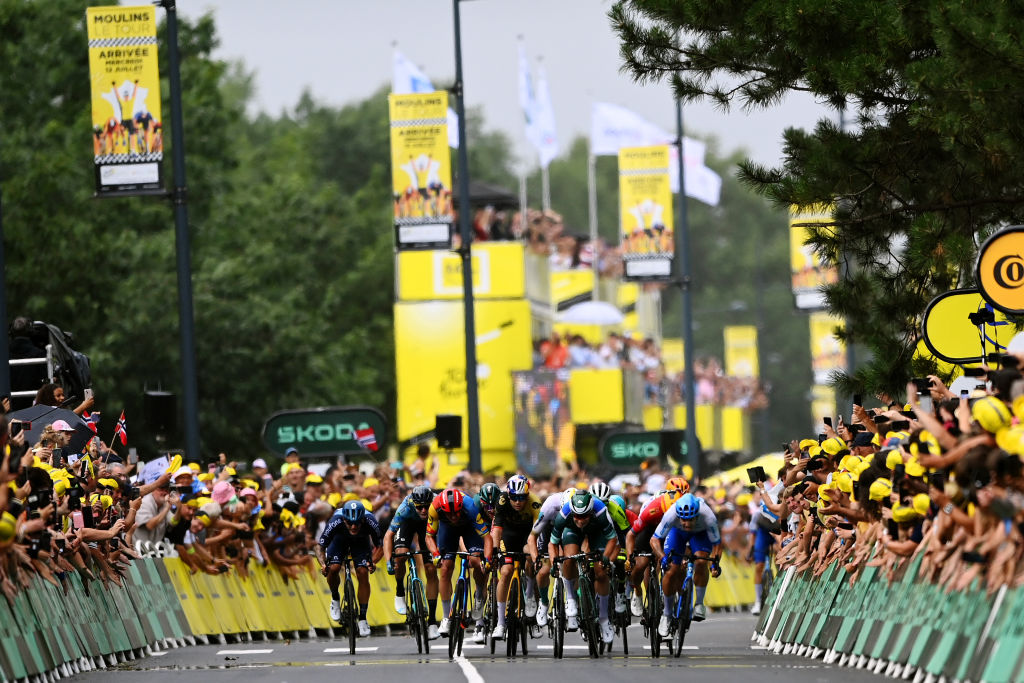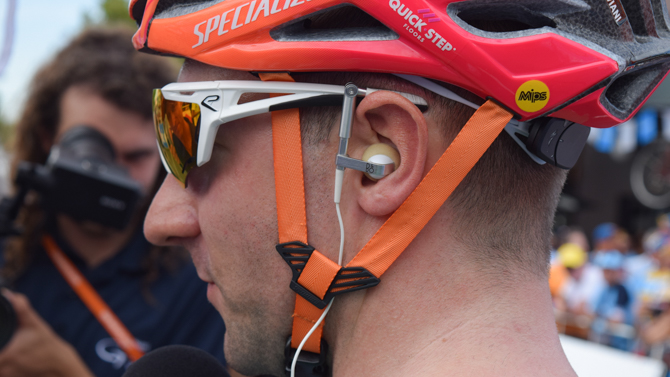Tour de France to be proving ground for changes to UCI 3km rule, time gap calculations
'Yellow card' system to be imposed as part of SafeR safety project, restrictions on earpieces up for discussion

The UCI announced three new measures to improve safety during road races on Wednesday, with subtle changes to the 3km rule, calculating time gaps in the peloton during sprint stages, and a new 'yellow card' system to punish repeat offenders breaking the rules during races.
The changes will be tested during the 2024 season, with "select stages" at the Tour de France being used as a proving ground for more flexible bunch sprint rules.
The yellow card system will be implemented without sanctions this year, but a system of increased punishment for repeat offenders will be on the rulebook from January 1, 2025.
All of the changes were based on the recommendations of the SafeR project, an independent group responsible for analysing risks during UCI WorldTour, Women's WorldTour and ProSeries races and providing safety advice.
"SafeR demonstrates that all the cycling families can work together to improve safety, which is fundamental to the future of our sport," Tour de France general director Christian Prudhomme said.
"These latest initiatives show that our regulations can evolve as our sport continues to develop and face new challenges. With certain measures already being introduced for the Tour de France, this is proof of the collaboration to improve safety within the cycling families."
Yellow cards

The yellow card system will begin on August 1, 2024. The UCI took care to note the cards will not be physical objects like in football but will be noted on the race communiqué in the same way the current rule violations are noted.
Get The Leadout Newsletter
The latest race content, interviews, features, reviews and expert buying guides, direct to your inbox!
The difference is that the UCI will be tracking how many violations each member of the race convoy accumulates and hand out suspensions of up to 30 days for multiple offences.
"A large survey conducted last year indicated the need for a yellow card system in cycling, which will be tested in the coming months before being implemented next year," CPA President Adam Hansen said.
"These initial measures recommended by SafeR to the UCI demonstrate that riders' requests are being heard and acted upon. It is crucial, and we are making significant progress in this area. There is still much work to be done, and I look forward to continuing the solid work that has begun."
Until January 1, 2025, the current system of docking UCI points and fines in Swiss francs will continue. Each violation will be entered into a yellow card database but no suspensions will be handed out until next year.
The proposed punishments once the system is in place are disqualification and a seven-day suspension for two yellow cards in the same race, a 14-day suspension for three yellow cards in 30 days and a 30-day suspension for six yellow cards in one year.
However, once the punishment for multiple yellow cards has been completed, the individual's record starts clean again.
If a rider is suspended during a race for accumulating multiple yellow cards, they will be ejected from the race but will get to keep any results and UCI points gained during the race.
Yellow cards can be handed out to riders, team staff, drivers of race vehicles, "who might engage in behaviour that could jeopardise the safety of the event. In addition, the system will aim to make all these people more responsible by introducing the monitoring of bad conduct over time and consequently encouraging respectful behaviour."
Rule violations that can result in a yellow card:
- Taking off a mandatory helmet during the race
- Disposing of waste outside the litter zone
- Madison-style hand slings between teammates or riders of different teams
- Pushing off a car, riders pushing other riders or riders receiving repeated pushes from spectators
- Holding onto a team car or getting mechanical assistance from a moving vehicle
- Sheltering behind the slipstream of a vehicle
- Irregular feeding (sticky bottle)
- Irregular sprinting (includes physical contact, rider deviating from their line, etc)
- Deviation from the race route
- Use of sidewalks/pavements/paths that are not part of the race route
- Passing through a level crossing that is closed or in the process of closing
- Improper conduction (assaulting spectators or other riders, indecent behaviour)
- Cars/motorbikes obstructing the movement of riders or other vehicles
- Failure to comply with commissaire instructions
- Interviewing riders during a race (includes media vehicle drivers and journalists)
- Interviewing a sports director during the last 10km (sports director, media driver, journalist)
Tour de France tests

The UCI is looking to add more flexibility to the "three-kilometre rule" that allows riders to be given the same time as the group they were with if they are halted by a crash or mechanical. The distance was previously one kilometre but was extended in 2005.
During the Tour de France, the UCI will test extending the rule further to five kilometres as well as experiment with a maximum time gap between groups of three seconds rather than one.
The difference is approximately 50 metres between riders rather than 17 metres and will allow non-sprinters more room to sit out the mayhem of a bunch gallop without sacrificing their position in the general classification.
"Feedback has shown that the majority of riders wanted the 3km rule extended to reduce stress during hectic race finales," Hansen said.
"I am thrilled that this will be tested at some sprint finals at the Tour de France, and I thank the UCI and ASO for allowing it."
Race radio limits on the horizon

Race radios/earpieces also came up in the press release, with the UCI announcing it would "test the effects of a restriction on wearing and using earpieces in races this year" but no decision has been made on how or when the restrictions would be tested, but they used an example of limiting earpieces to two riders per team.
The UCI attempted to ban earpieces in 2011, even testing a full ban during the Tour de France on stage 10. Teams suggested allowing two riders per team to have earpieces but were rejected by the UCI.
At the end of 2011, the issue came to a head with teams threatening to boycott the Tour of Beijing if the UCI didn't relent in its pursuit of a full race radio ban. Eventually, the UCI banned radios in lower-level races and at the World Championships.

Laura Weislo has been with Cyclingnews since 2006 after making a switch from a career in science. As Managing Editor, she coordinates coverage for North American events and global news. As former elite-level road racer who dabbled in cyclo-cross and track, Laura has a passion for all three disciplines. When not working she likes to go camping and explore lesser traveled roads, paths and gravel tracks. Laura specialises in covering doping, anti-doping, UCI governance and performing data analysis.